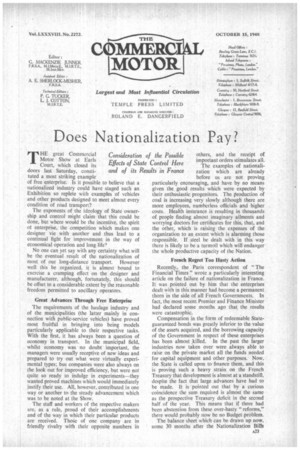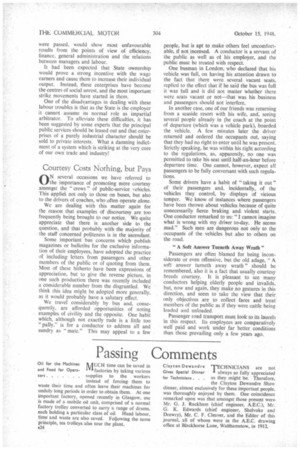Does Nationalization Pay?
Page 25

Page 26

If you've noticed an error in this article please click here to report it so we can fix it.
THE great Commercial Motor Show at Earls Court, which closed its doors last Saturday, constituted a most striking example of free enterprise. Is it possible to believe that a nationalized industry could have staged such an Exhibition so replete with examples of vehicles and other products designed to meet almost every condition of road transport?
The exponents of the ideology of State ownership and control might claim that this could be done, but where would be the incentive, the spirit of enterprise, the competition which makes one designer vie with another and thus lead to a continual fight for improvement in the way of economical operation and long life/ No one can yet say with any certainty what will be the eventual result of the nationalization of most of our long-distance transport. However well this be organized, it is almost bound to exercise a cramping effect on the designer and manufacturer, although, fortunately, this should be offset to a considerable -extent by the reasonable freedom permitted to ancillary operators.
Great Advances Through Free Enterprise The requirements of the haulage industry and of the municipalities (the latter mainly in connection with public-service vehicles) have proved most fruitful in bringing into being models particularly applicable to their respective tasks. With the first, it has always been a question of economy in transport. In the municipal field, whilst economy was no doubt important, the managers were usually receptive of new ideas and prepared to try out what were virtually experimental types; bus companies were also always on the look out for improved efficiency, but were not quite so ready to indulge in experiments—they wanted proved machines which would immediately justify their use. All, however, contributed. in one way or another to the steady advancement which was to be noted at the Show.
The staff and workers of the respective makers are, as a rule, proud of their accomplishments and of the way in which their particular products are received. Those of one company are in friendly rivalry with their opposite numbers in others, and the receipt of important orders stimulates all.
The examples of nationalization which are already before us are not proving particularly encouraging, and have by no means given the good results which were expected by their enthusiastic progenitors. The Production of coal is increasing very slowly although there are more employees, numberless officials and higher costs. Health insurance is resulting in thousands of people finding almost imaginary ailments and worrying doctors for certificates for this, that, and the other, which is raising the expenses of the organization to an extent which is alarming those• responsible. If steel be dealt with in this way there is likely to be a turmoil which will endanger the whole productive capacity of the Nation, French Regret Too Hasty Action Recently,. the Paris correspondent of "The Financial Times" wrote a particularly interesting article on the failure of nationalization in France. It was pointed out by him that the enterprises dealt with in this manner had become a permanent thorn in the side of all French Governments. In fact, the most recent Premier and Finance Minister had declared some months ago that the results were catastrophic.
Compensation in the form of redeemable Stateguaranteed bonds was greatly inferior to the value of the assets acquired, and the borrowing capacity of the Government in respect of these enterprises has been almost ,killed. In the past the larger industries now taken over were always able to raise on the private market all the funds needed for capital equipment and other purposes. Now, the State is called upon to finance them, and this is proving such a heavy strain on the French Treasury that development is almost at a standstill, despite the fact that large advances have had to be made. It is pointed out that by a curious coincidence the sum requited is almost the same as the prospective Treasury deficit in the second half of the year. This means that if there had been abstention from these over-hasty "reforms,' there would probably now be no Budget problem.
The balance sheet which can be drawn up now, some 30 months after the Nationalization Bills were passed, would show most unfavourable results from the points of view of efficiency, finance, general administration and the relations between managers and labour.
It had been expected that State ownership would prove a strong incentive with the wage earners and cause them to increase their individual output. Instead, these enterprises have become the centres of social unrest, and the most important strike movements have started in them.
One of the disadxantages in dealing with these labour troubles is that as the State is the employer it cannot assume its normal role as impartial arbitrator. To alleviate these difficulties, it has been suggested by some experts that the principal public services should be leased out and that enterprises of a purely industrial character should be sold to private interests. What a damning indictment of a system which is striking at the very core of our own trade and industry!
Courtesy Costs Nothing, but Pays
ON several occasions we have referred to the importance of promoting more courtesy amongst the " crews " of public-service vehicles. This appliti not only to those on buses, but also to the drivers of coaches, who often operate alone.
We are dealing with this matter again for the reason that examples of discourtesy are too frequently being brought to our notice. We quite appreciate that there is another side to the question, and that probably with the majority of the staff concerned politeness is in the ascendant.
Some important bus concerns which publish magazines or bulletihs for the exclusive information of their employees, have adopted the practice of including. letters from passengers and other members of the public or of quoting from them. Most of these hitherto have been expressions of appreciation, but to give the reverse picture, in one such production there was recently included a considerable number from the disgruntled. We think this idea might be adopted more generally, as it would probably have a salutary effect.
We travel considerably by bus and, consequently, are afforded opportunities of noting examples of civility and the opposite. One habit which, although not exactly rude is a little too "pally." is for a conductor to address all and sundry as "mate." This may appeal to a few people, but is apt to make others feel uncomfortable, if not incensed. A conductor is a servant of the public as well as of his employer, and the public must be treated with respect. One busman in London, who declared that his vehicle was full, on having his attention drawn to the fact that there were several vacant seats, replied to the effect that if he said the bus was full it was full and it did not matter whether there were seats vacant or not—that was his business and passengers should not interfere.
In another case, one of our friends was returning from a seaside resort with his wife, and, seeing several people already in the coach at the point of departure (which was a vehicle park), boarded the vehicle. A few minutes later the driver returned and ordered the occupants out, saying that they had no right to enter until he was present. Strictly speaking, he was within his right according to the regulations, as, apparently, no one was permitted to take his seat until half-an-hour before departure time. One cannot, however, expect all passengers to be fully conversant with such regulations.
Some drivers have a habit of "taking it out" of their passengers and. incidentally, of the vehicles they control, by displays of vicious temper. We know of instances where passengers have been thrown about vehicles because of quite unnecessarily fierce braking and violent starts. One conductor remarked to us: "I cannot imagine what is wrong with my driver to-day. He seems mad." Such men are dangerous not only to the occupants of the vehicles but also to others on the road.
"A Soft Answer Turneth Away Wrath"
Passengers are often blamed for being inconsiderate or even offensive, but the old adage, "A soft answer turneth away wrath" should be remembered, also it is a fact that usually courtesy breeds courtesy. It is pleasant to see many conductors helping elderly people and invalids. but, now and again, they make no gestures in this direction, and seem to take the view that their only objectives are to collect fares and treat members of the public as if they were cattle being loaded and unloaded.
Passenger road transport must look to its laurels in this respect. Its employees are comparatively well paid and work under far better conditions than those prevailing only a few years ago.




















































































